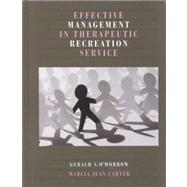After introducing the student to the management discipline and the therapeutic recreation manager's job (including the transition from practitioner to manager), Part 1 considers the characteristics of management. Part 2 examines selective administrative functions that support effective and efficient management. Operational management is the focus of Part 3. Part 4 considers elements associated with human service management. Part 5 considers those issues associated with the consumer.









